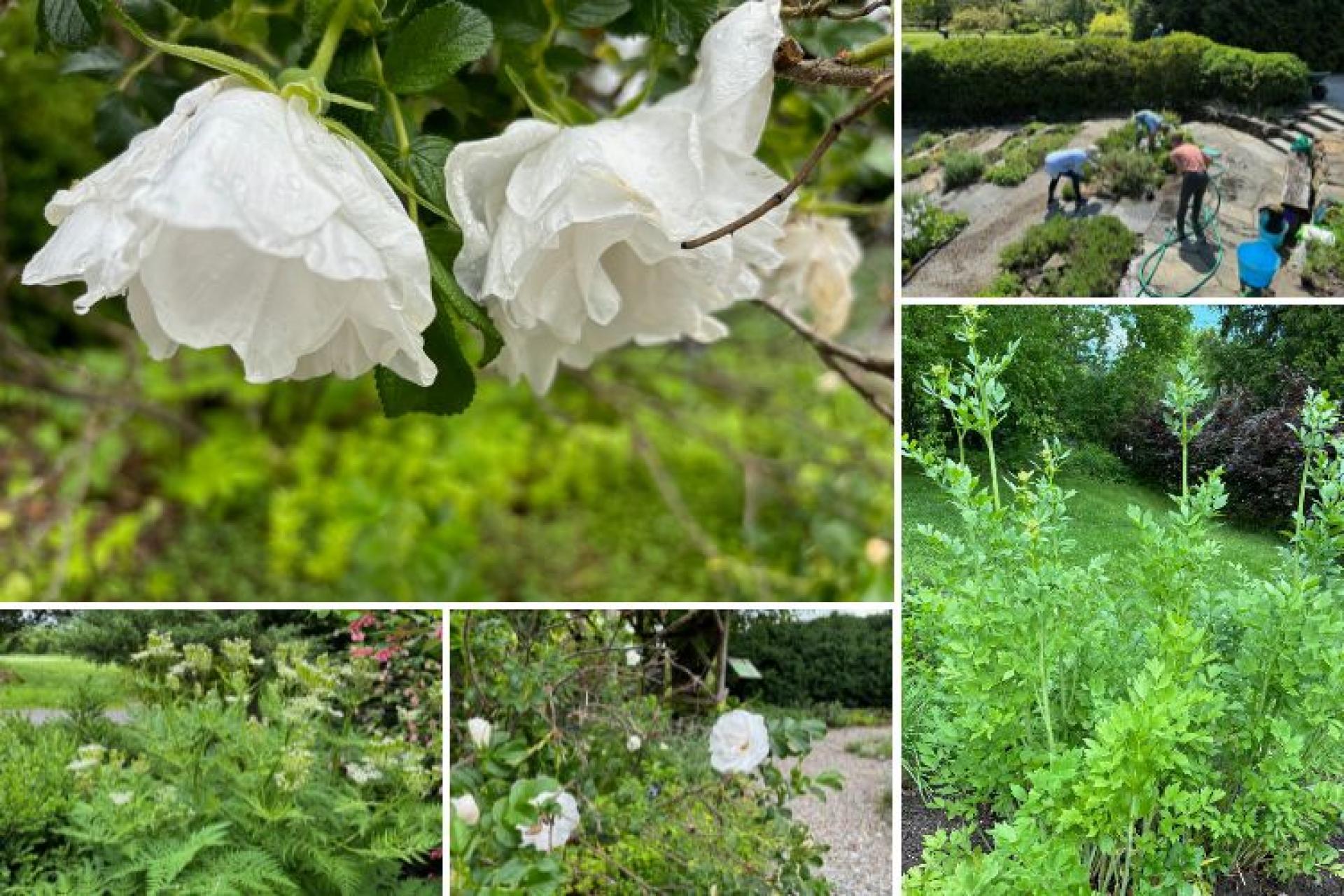You are here
What Is Happening in the BBG Herb Gardens This Week (May 28)
What Is Happening in the BBG Herb Gardens This Week (May 28)
By Barbara F. Smith
Come visit Sweet Cicely (Myrrhis odorata), now blooming in the BBG Herb Display Garden. A clue to this nearly forgotten herb is the name of its genus “myrrha,” which means fragrant. English author Eleanour Sinclair Rohde in the 1920’s wrote of this plant, “[f]or if Lavender is the queen of herbs, Sweet Cicely is surely the princess. A shy, elusive princess adorned with beauty, grace and dignity.”
Everything about this highly fragrant herb smells and tastes of anise, with a green herbal and somewhat spicy note. Hardy to Zone 5, this herbaceous perennial grows to be three feet tall and two feet wide, with flat umbels of white flowers in spring and early summer, and delicate, fern-like leaves. Sweet Cicely thrives in rich soil and light shade. The plant can be invasive; to prevent spreading, harvest the seeds while green.
Sweet Cicely has many culinary uses – chop the leaves into salads, dressings, soups, and stews. The edible flowers may be used to enhance the taste of fruit salads, applesauce or rhubarb tarts. Sweet Cicely is an ingredient that flavors liqueurs, such as Chartreuse, and home gardeners may use the ingredient to prepare spiced wine, iced tea or even baked goods. Medicinally, the plant may be used for digestive complaints and coughs.
Also currently blooming in the fragrance area of the Herb Display Garden is the Rugosa Rose “Blanc Double de Coubert,” an heirloom variety bred in France in the 1800s. This vigorous, hardy shrub has pure white blossoms of incredible scent and dark green, glossy leaves. The blooming season is long, followed by scarlet rose hips. It prefers full sun and well-drained soil to thrive.
In the BBG Herb Production Garden, located behind the Center House, the herb Lovage (Levisticum officinale) — also known as “love parsley” — is thriving. As one author wrote, “the evocatively romantic name” might make you grow the plant. But the “earthy, smoky, celery flavor with underlying hints of curry will hook you.”
Lovage leaves add a tasty richness to bean or cream soups, meat stews, omelets, or meatloaf. Lovage tases great with potato salads, stuffings, and chicken. An old-fashioned cordial is made of lovage, yarrow and tansy, and its seeds are used in both perfumery and liqueurs. A 17th century herbalist wrote that a lovage leaves tincture on the skin would remove freckles!
Lovage is much simpler to grow than celery, and its leaves, stems and roots can be harvested as needed. Lovage stores fairly well frozen; quickly blanch a small number of leaves then plunge them into ice water for two minutes and store in an ice cube tray for easy use later. Drying leaves also preserves them. Cut young growth and hang the stems (or lay them on a screen) in a warm shady spot. When dried, store the leaves in an opaque container to preserve the color.
Information for this article was gleaned in part from some of my favorite reference books: “100 Herbs to Grow: A comprehensive guide to the best culinary and medicinal herbs” by Jekka McVicar; “The New American Herbal” by Stephen Orr; “The Culinary Herbal” by S. Belsinger and A. O. Tucker; and “Rodale’s Illustrated Encyclopedia of Herbs.” One or more of these volumes would be a welcome addition to the home gardener’s library, or you may choose to check them out from your local library.
Planting season work in the Herb Production Garden and the latest efforts of the Herb Associates Kitchen Crew will each be featured in next week’s article. Thanks for your interest in all things herbal at BBG!
The Berkshire Botanical Garden’s Herb Associates began in 1957 and have been making and selling products for the benefit of BBG ever since. At BBG, the Herb Associates oversee a display garden and production garden, both located near the Center House. Members/volunteers meet every Tuesday morning during the late spring through mid-autumn each year, coinciding when the gardens themselves are open to the public. Members plant, weed and tend the gardens, as well as harvest and process the variety of herbs.
Help Our Garden Grow!
Your donation helps us to educate and inspire visitors of all ages on the art and science of gardening and the preservation of our environment.
All donations are 100 percent tax deductible.



